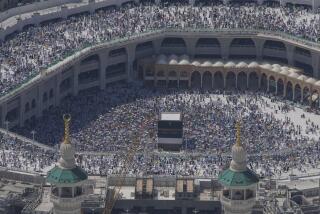Iraqi Flights to Ferry Pilgrims Home Irk U.S.
- Share via
WASHINGTON — The Clinton administration vowed Tuesday to continue enforcing its ban on flights by Iraqi military aircraft, although it acknowledged that Saddam Hussein’s government got away with a “high wire act of political provocation” by sending helicopters to transport Muslim pilgrims across the southern “no-fly” zone.
President Clinton, answering reporters’ questions, accused Hussein of perverting religion by using the pilgrims, who were returning from the annual hajj to Mecca, to cover his violation of the prohibition on Iraqi military flights that the United States and its allies imposed after Iraq’s defeat in the Persian Gulf War.
“We don’t want to see religion, in effect, used and distorted in a way to try to avoid the international obligations that are imposed,” Clinton said as he left the White House to inspect flood damage in North Dakota.
But State Department spokesman Nicholas Burns said the Iraqi helicopter armada, which news agencies said ferried more than 1,100 Muslims, would not be allowed to erode enforcement of the northern and southern “no-fly” zones.
U.S., British and French warplanes are authorized to shoot down Iraqi aircraft that violate the airspace. Most Iraqi tanks and other military vehicles are also banned from the two zones, each covering about one-third of Iraqi territory.
“If Iraq thinks that by pushing its nose under the tent, as it has done, it can seek to build up any kind of military capability in the north or south, it is sadly mistaken,” Burns said.
There is no evidence that Iraq planned to follow the pilgrim flights with a direct military challenge, Burns said, but he added that Hussein should not “test the resolve of the United States.”
While saying that the U.S. military would never attack a helicopter full of unarmed civilians, Burns said that the administration wants to make it “absolutely clear that we intend to continue to enforce the ‘no-fly,’ ‘no-drive’ zones,” and that “any type of military provocation . . . will not succeed.”
It was the second time in slightly more than a week that Iraq used the annual Muslim pilgrimage to thumb its nose at the United States and its allies over the “no-fly” zone. Baghdad had earlier used a passenger jet to fly Muslims from Iraq to Saudi Arabia for the hajj.
Iraq was also the second nation to cite the hajj in violating United Nations sanctions. As it has for three years running, Libya arranged flights for pilgrims, defying an air embargo intended to ground Libya’s commercial airline fleet in retaliation for alleged Libyan complicity in the 1988 bombing of a Pan Am jumbo jet over Scotland.
U.S. officials acknowledged that there is little they can do to prevent such pilgrim flights because any use of force against people practicing their religion is unthinkable.
Iraq said its helicopters picked up their passengers at the Arar border crossing with Saudi Arabia, and delivered them to their home provinces throughout Iraq.
The landing site is in the southern “no-fly” zone, so all of the flights were technical violations.
More to Read
Sign up for Essential California
The most important California stories and recommendations in your inbox every morning.
You may occasionally receive promotional content from the Los Angeles Times.










